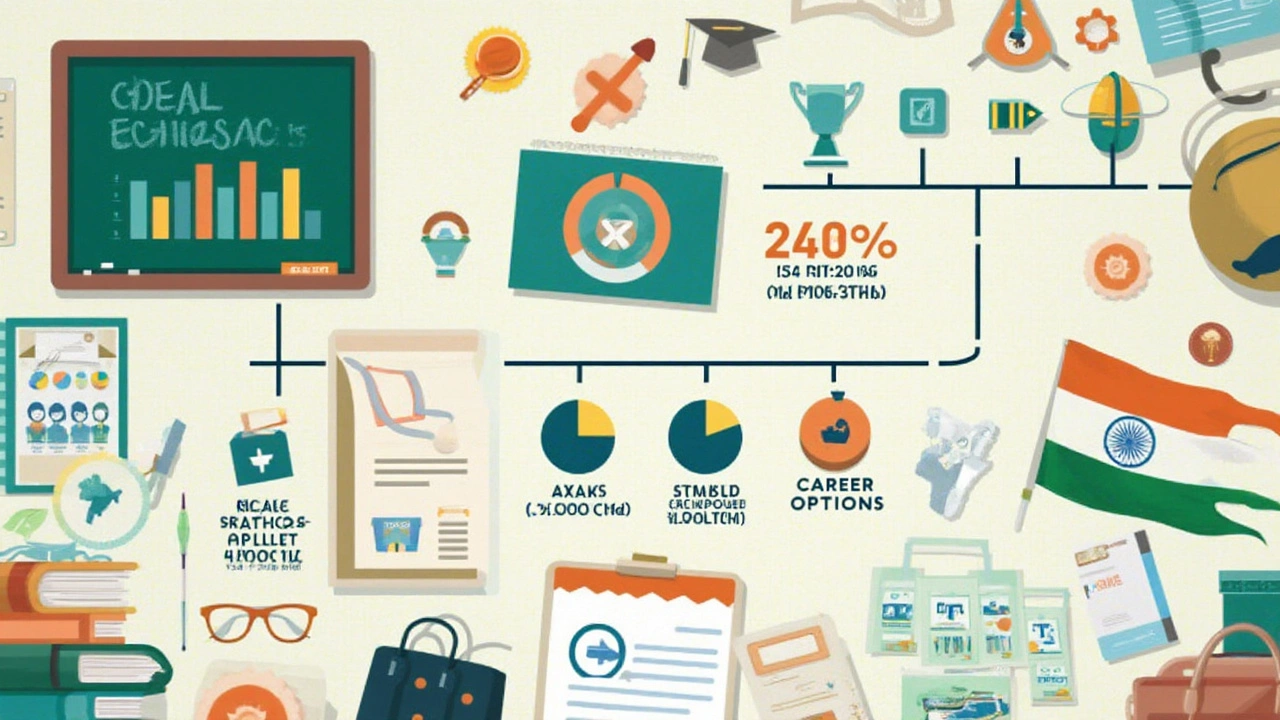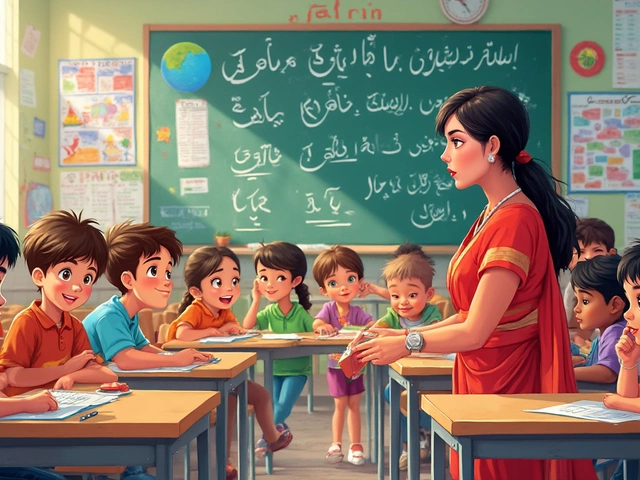
If someone told you all school boards in India are the same, they’ve probably never crammed for a math exam at 3 a.m. or stared blankly at an endless list of English essays. Let’s get real: not all boards leave kids drenched in the same amount of sweat and anxiety. The myth that all Indian boards are equally tough doesn’t stand up to what students, teachers, and even coaching centers experience every single year. For decades, picking the perfect board has been a make-or-break decision for Indian families—almost like choosing between biryani and butter chicken (except your future is on the line, not just your dinner plans). So, where do CBSE and ICSE—India’s two giants—actually stand on the toughness scale? The answer is surprising, and way messier than a simple ranking.
What Makes a Board Tough? The Secret Sauce of Stress
You can’t really judge a board’s toughness just by the length of its syllabus, or how hard the sample papers look at first glance. There’s a whole cocktail of factors here: depth and breadth of curriculum, language requirements, marking schemes, quality of textbooks, pressure of board exams, availability of good tuition, and even the cultural expectations that lurk in every homework-filled evening. While many Indian boards cater to different state syllabi (like Maharashtra or Tamil Nadu State Boards), the spotlight often falls on CBSE and ICSE, because they’re the ones most pan-India teens butt heads with.
Here’s the kicker: the Central Board of Secondary Education (CBSE) and the Indian Certificate of Secondary Education (ICSE) aren’t just different in name. Their philosophies, assessment styles, and even day-to-day classwork can feel like apples and oranges. Or maybe even apples and dragon fruit—it really depends whose horror stories you’re listening to. But what’s definite is this: toughness in a board isn’t just about “being hard.” It’s how much conceptual clarity, memorization, and analytical skills you absolutely must develop to survive and thrive. That’s where the difference gets real.
Also, you can’t ignore how college entrance tests (like JEE, NEET, or CLAT) and university cut-off lists often favor certain boards or syllabi. This means the definition of ‘tough’ can sometimes blur with ‘best for future prospects,’ which changes the whole game for many families. The intense competition for top colleges has made the board you pick one of the most critical choices in a student’s early life.
Let’s break down some factors that shape the “toughness” of a board:
- Curriculum breadth vs. depth: Is the board more about covering many topics, or digging deeper into each?
- Assessment type: Objective (like MCQs) or subjective (long essays, practicals)?
- Medium of instruction: English-heavy or bilingual?
- Weightage to projects and practicals versus rote-learning exams.
- Consistency in marking—do evaluators give marks for all steps, or is it all-or-nothing?
- Textbook quality—are they simple or packed with advanced info and concepts?
If you look at reports from coaching institutes in cities like Delhi or Bangalore, it’s clear that CBSE gets preference for competitive exam prep, while ICSE is trusted for developing great English and creative thinking. That says a lot about their DNA—and their toughness.
All Eyes on CBSE: Lean, Mean, and Focused on Competitive Exams
CBSE is the giant of the Indian education scene—think 27,000 schools in India and more than 240 schools in 28 foreign countries as of 2024. Over 1.8 million students appeared for the CBSE Class 12 board exams in 2024. The curriculum is set by the NCERT (National Council of Educational Research and Training), and honestly, it’s designed to churn out toppers for the highest-level competitive exams.
So, what makes CBSE tough? For one, while the curriculum is focused, it demands razor-sharp clarity of basics, especially in science and math. There’s a no-nonsense structure to the textbooks. Every student knows that CBSE math and physics papers can throw tricky problems with a twist—they check not just what you memorized, but whether you actually understood the principles. In the 2023 CBSE Class 12 results, many students reported that Physics and Math papers had 40% application-based questions—way above the national average in earlier years. That means you can’t wing it with just rote learning.
Another fact: CBSE is the default board for most national-level entrance exams. JEE, NEET, CUET—they’re all structured around the CBSE syllabus. That heavies up the pressure for Board students because they’re prepping for two battlefronts: scoring big in boards and being ready for cut-throat competition exams. The grind is real.
One more nod to CBSE: it gives weightage to internal assessments and project work, which helps if you’re good at science fairs or English projects. School-based practicals count, and that adds layers of work beyond just writing answers in an exam hall. However, there’s some relief—CBSE is known for more “student-friendly” marking, where steps are given partial credit in subjects like Math. If you can back up your answer with decent reasoning, you won’t lose the plot entirely.
But don’t think CBSE is an easy ride just because it’s popular. The focus on competitive exams, the demand to balance school and tuition, and the need to ace both theory and application, create a unique challenge of time management and psychological pressure.
Here’s a quick look at the data comparing recent CBSE board results:
| Year | Class 10 Students Appeared | Pass Percentage |
|---|---|---|
| 2022 | 21.1 lakh | 94.40% |
| 2023 | 21.8 lakh | 92.71% |
| 2024 | 22.3 lakh | 93.25% |
While the pass percentage looks high, the cut-throat competition for top marks (and top colleges) pushes every student to the limit. The top 1% are often separated from the rest by just a handful of marks.

The ICSE Challenge: Detail-Heavy, Language-Rich, Tough to the Core
ICSE (Indian Certificate of Secondary Education), run by the CISCE board, flies under the radar for many until you actually get a peek at its exam papers or textbooks. Unlike CBSE, ICSE is all about the details—the English is advanced, the coursework is extra deep (especially in environmental science and literature), and the project work has way more weight.
Expect a massive stack of prescribed books and the need to write long, analytical answers. English isn’t just a medium here; it’s a major subject, with a focus bordering on obsession. The essays and comprehension sections in English literature require real creativity and a strong grasp of language. In fact, English marks often make or break your final score in ICSE, which is a nightmare for many who aren’t natural writers or speakers.
Let’s talk about the science subjects—ICSE divides them into Physics, Chemistry, and Biology even in lower classes. This is a shock for many who switch from another board. The syllabus goes more in-depth, and the practical-oriented assignments can mean extra hours in labs or at your desk, prepping reports and diagrams. In the 2024 ICSE board exams, over 78% of students found the science questions more detailed and time-consuming than before, based on survey data shared by the CISCE itself. You don’t just need to know the formula—you need to show every logical step, often with elaborate explanations and diagrams.
ICSE’s marking scheme isn’t as forgiving as CBSE. Graders expect answers to be as close to textbook perfection as possible, with crystal-clear English. The evaluation is stricter and loses few marks to ‘sympathy’—there are stories of top students losing points over spelling or grammar slips.
Another point: ICSE doesn’t shy away from a very international flavor. Its curriculum is modeled with reference to Cambridge and other global standards, so you’ll see topics in literature, history, and geography that go beyond ‘Indian’ context. In the best ICSE schools, this broadens your perspective, but it also increases the amount of content to learn by heart.
ICSE’s heavy emphasis on projects (20-30% in some subjects) means it rewards kids who are creative and disciplined. But the flip side: it also ramps up pressure for those not so confident outside an exam hall. The syllabus loads up fast—and for those aiming for engineering or med school later, switching to CBSE in Class 11 is common because that’s what most entrance tests are based on.
Check out this comparison table of recent ICSE board stats:
| Year | Class 10 Students Appeared | Pass Percentage |
|---|---|---|
| 2022 | 2.3 lakh | 99.98% |
| 2023 | 2.4 lakh | 98.94% |
| 2024 | 2.5 lakh | 99.27% |
High pass percentages might make ICSE sound easy, but remember these are mostly from elite urban schools—competition for top ranks is savage. The board’s complexity lies in the workload and the need for precision in every subject.
CBSE vs ICSE: Real Student Experiences and Practical Comparison
If you ask kids who’ve switched boards, or parents with kids in both, you hear this again and again: ICSE is tougher in terms of depth, advanced inference, and language skills. CBSE is tougher for those gearing up for India’s monstrous entrance test machine. But let’s dig deeper.
Here are some real, on-the-ground differences that make one board harder than the other for different types of students:
- CBSE students often feel under more pressure to compete, especially as every single mark in Math or Science can make or break their future exam success.
- ICSE kids spend more hours after school finishing long essays, detailed science journals, and history projects that are far from plug-and-play. For those who dislike writing, this feels like torture.
- Classic complaint: “CBSE gives you a ladder for national-level exams, but ICSE actually makes you think before climbing on it.”
- ICSE’s advanced English (and second language options like French or Sanskrit) often leave even smart students struggling, since perfect grammar and lengthy essays are essential. It’s common for ICSE students to take tuitions in English—unthinkable for many CBSE families.
- CBSE is much more straightforward in language; ICSE loves elaborate, structured answers—in some subjects, word-for-word accuracy matters.
- For many from small towns or villages, finding a good ICSE school is a challenge. CBSE’s wide reach and comparable quality across urban and semi-urban centers is a major plus.
- Because many top coaching chains (like Allen, FIITJEE, Aakash) structure everything around CBSE and NCERT texts, students from state boards or ICSE often have to run their own ‘dual prep’ for boards and entrances—another level of effort.
One honest tip you learn from real students: if your strength is mugging up facts, CBSE can save you in subjects like History. But for subjects like English or even ICSE Social Science, where inference and interpretation matter more, only conceptual understanding gets you full marks. And don’t forget, in Class 10 ICSE, you face three science exams and two English exams—CBSE has it condensed into one each. That’s a real volume difference.
According to a Delhi-based survey in 2024 covering over 4,500 students who switched from ICSE to CBSE (or vice versa) for Classes 10–12:
| Area of Study | CBSE Toughness Score | ICSE Toughness Score |
|---|---|---|
| Science/Math Exams | 7/10 | 8.5/10 |
| Language/English Papers | 6/10 | 9/10 |
| Competitive Exam Prep | 9.5/10 | 6/10 |
| Project/Assignments | 6/10 | 8/10 |
The numbers say it all: ICSE may be the toughest in terms of depth and workload, but CBSE piles on intensity when it comes to the race for national exam glory.

Tips for Surviving and Thriving in India’s Toughest Boards
Facing either CBSE or ICSE head-on can feel like running a marathon with a backpack full of bricks. The pressure is sky-high, but plenty of teens do emerge victorious (and mostly sane). If you want to come out on top, here are some field-tested hacks and tips straight from board veterans, teachers, and counselors:
- Don’t try to do it all—focus is your best weapon. Figure out your weakest link (math, language, or projects) and attack it first.
- Use NCERT textbooks for CBSE and the CISCE-prescribed books for ICSE religiously. No shortcut carries as much weight as these in exams.
- For CBSE, solve last 5 years’ question papers. The same types of questions often repeat and you’ll get used to the examiner’s mindset.
- For ICSE, develop a genuine love (or at least tolerance) for writing long answers. Practice sample essays and ask classmates or teachers to grade you hard, especially in English and history.
- Both boards reward you for neatness, diagrams, and step-by-step answers in science subjects. Even if you don’t know the final answer, write what you do know. Partial marks might save you.
- Project work in ICSE? Start early. Don’t leave those eco journals or literature projects for the last minute—teachers can spot rushed work a mile away (and penalize you accordingly).
- Use online resources, YouTube channels, or coaching apps only as supplements—not your main study guide. Boards want you to stick to their syllabus.
- Take regular mock tests under timed conditions, especially for math and science. The faster you write and recall, the more marks you’ll rack up.
- Group study helps for both boards, but pick peers who are stronger in your weaknesses, not your friends. Iron sharpens iron.
- If English trips you up in ICSE, read newspapers, novels, and practice comprehension daily. It actually boosts your score.
- Don’t ignore mental health. Pace yourself, and take breaks. Burnout is real, and a tired brain remembers nothing.
Here’s one myth-busting fact: there’s no single “best” or “toughest” board for everyone. Your strengths, career goals, support system at home, and school options all matter. What’s important is embracing the style of your board, not constantly comparing it to others. Every year, thousands crack exams and land top spots in the toughest colleges, coming from both ICSE and CBSE backgrounds.
If you’re still weighing your choices, talk to alumni from your target schools—get the real, uncensored story. And don’t let anyone tell you success or struggle is “guaranteed” with a particular board. You are the key factor, not the logo on your certificate.
More Articles

Top Websites for Finding Government Jobs in 2025
Finding the right platform to search for government jobs can be a game-changer in today's competitive job market. Our article delves into the most efficient and reliable websites for government job seekers, revealing crucial tips and facts for optimizing your job hunt. From niche portals to comprehensive job boards, we explore the best online resources that can connect you with promising government employment opportunities. Whether you're a recent graduate or a seasoned professional, our guide provides the insights you need to succeed.

Is 2 Years Enough for JEE? What It Takes to Crack the Exam
Thinking about preparing for the JEE in two years? This article dives into what really goes into those 24 months—study techniques, mistakes to avoid, and clever hacks to use your time wisely. Get honest insights on real-life schedules, how toppers managed their prep, and the tricky balance between school and coaching. If you're feeling the pressure or unsure about your timeline, here's what you need to make those two years count.

CBSE Students Count in India: Beyond the Numbers
The CBSE board in India registers some of the highest numbers of students across the country. It provides a flexible and diverse curriculum that is favored by many for its structured approach. We'll explore how many students are actually enrolled under the CBSE board and what this indicates about education trends in India. Insightful facts and tips on navigating the CBSE system can help students and parents understand the board's influence and offerings. Whether you're looking into schools or just curious, this article sheds light on the numbers and beyond.
